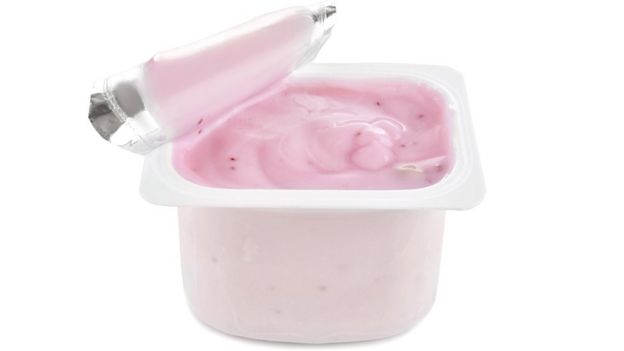Many yoghurts are full of sugar and the public should not be lulled into thinking they are eating healthy products, researchers say.
The conclusion comes after a study of almost 900 yoghurts on sale in UK supermarkets.
The Leeds University-led research found that organic yoghurts were among the most sugary types - containing more sugar per 100g than cola.
Only natural and Greek-style yoghurts could be classed as low in sugar.
The study - published in BMJ Open - comes as government health officials are encouraging manufacturers to reduce the amount of sugar consumed by the public.
Yoghurts have been identified as one of the food types on which Public Health England wants to see progress.
This research was undertaken shortly after the launch of the sugar-reduction programme.

Unsurprisingly, yoghurt desserts contained the most sugar - an average of 16.4g per 100g.
This category also included some products that did not contain yoghurt, such as chocolate mousse and creme caramel.
The second most sugary product was organic yoghurts with a typical 13.1g per 100g.
Children's yoghurts typically contained 10.8g per 100g, the equivalent of more than two sugar cubes, the study found.
By comparison a 100g serving of a typical cola contains 9g of sugar.
The NHS recommends that children aged four to six have no more than 19g of sugar, or five sugar cubes a day, and it is advised that those aged seven to 10 consume less than 24g daily.
To be classed as low sugar there needs to be no more than 5g per 100g.
Only 9% of products surveyed were below this threshold.

How much sugar was in the yoghurt?
Desserts - 16.4g per 100g
Organic - 13.1g per 100g
Flavoured - 12g per 100g
Fruit - 11.9g per 100g
Children's - 10.8g per 100g
Dairy alternatives - 9.2g per 100g
Drinks - 9.1g per 100g
Natural and Greek - 5g per 100g

Since the fieldwork for the study was carried out - at the end of 2016 - progress has been made on reducing sugar consumption from yoghurts.
A report published in May showed sugar content in yoghurts had been reduced by 6% in the first year, making it the only food category to exceed the 5% target. By 2020, it is expected sugar will be reduced by 20%.
PHE chief nutritionist Dr Alison Tedstone said this showed "positive steps" were being made.
But Dr Bernadette Moore, lead researcher of this study, said: "Even if we take the reduction into account, most of these yoghurts will still not be low in sugar.
"I think people, including parents, will be surprised to know just how much sugar there is in yoghurt.
"My advice would be to buy natural yoghurt and mix in your own fruit."
Latest Stories
-
Thousands of job opportunities opened for the youth under Ghana’s Petroleum Hub Project – CEO
7 mins -
Gov’t must act on clean air now – Prof Kofi Amegah
18 mins -
Politicians who ignore social media as a constituency risk losing out – Technology Analyst
36 mins -
Akufo-Addo has built over 200 hospitals, most by any president – Ofosu Nkansah
38 mins -
Today’s front pages: Wednesday, November 27, 2024
39 mins -
Misinformation and Disinformation go beyond simple errors – Caroline Anipah
44 mins -
Coalition of assembly members endorse John Mahama, promise him their votes
48 mins -
‘You believe Bawumia at your own risk’ – Afriyie Ankrah to Ghanaians
2 hours -
Election 2024: MFWA urges EC to lift media access restrictions at collation centres
2 hours -
Women and youth will make me President come December 7th – Alan Kyerematen declares
2 hours -
Akufo-Addo and Bawumia’s government favours slogans over substance – Mahama
2 hours -
Man handed life imprisonment after stabbing elder brother to death
2 hours -
Peace Council urges mutual respect and trust ahead of December polls
2 hours -
Ghana and Seychelles sign two agreements
2 hours -
GEPA calls for simplified digital systems to enhance cross-border trade
2 hours

